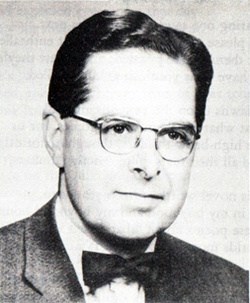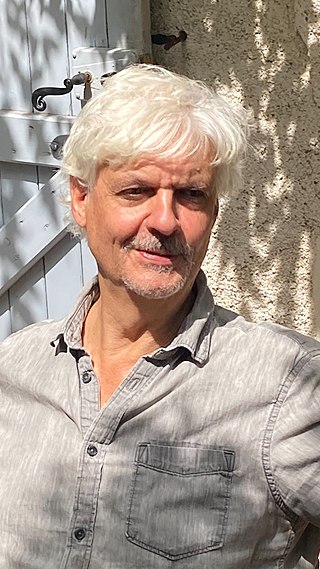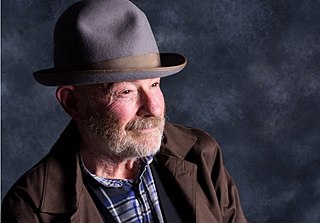Greg Delanty (born 1958) is an Irish poet. An issue of the British magazine, Agenda , was dedicated to him.[ citation needed ]
Greg Delanty (born 1958) is an Irish poet. An issue of the British magazine, Agenda , was dedicated to him.[ citation needed ]
Delanty was born in Cork City, Ireland, and is generally placed in the Irish tradition, though he is also considered a Vermont and US poet appearing in various US anthologies.[ citation needed ] He lives for most of the year in America, where he is the poet in residence at Saint Michael's College, Vermont. He became an American citizen in 1994, retaining his Irish citizenship. He is a past-president of the Association of Literary Scholars, Critics, and Writers.
Irish novelist Colum McCann, who has himself resettled in America, described Delanty as the "poet laureate of the contemporary Irish-in-America". McCann said: "Delanty has catalogued an entire generation and its relationship to exile. He is the laureate of those who have gone". [1]
Greg Delanty attended University College Cork (UCC) where he was taught by Sean Lucy and John Montague, [2] and was among a group of notable writers who emerged at the university in that period, including Maurice Riordan, Gregory O'Donoghue, Thomas McCarthy, William Wall, Gerry Murphy, and Seán Dunne. [2] Equally important to him,[ citation needed ] were the poets who wrote in Irish, in UCC, such as Liam Ó Muirthile, Nuala Ní Dhomhnaill, Louis DePaor and Colm Breathnach.[ citation needed ]
At UCC Delanty edited the university magazine Quarryman and published his first poems in The Cork Examiner . As an editor of two issues of Quarryman he published poems by poets writing in Irish (without translation) and English, and was the first to do so in Ireland.[ citation needed ] He also solicited poems from fellow students and poets throughout Ireland and beyond, such as Seamus Heaney, Paul Durcan, Edwin Morgan and David Gascoyne.[ citation needed ]
The entry in The Oxford Companion to Modern Poetry (second edition) on Delanty states that:
Among other entries on Greg Delanty are The Oxford Companion to Irish Literature (Oxford University Press, 1996) [4] and The Encyclopedia of the Irish in America (Notre Dame University Press, 1999)." [5] [JSTOR 1] After Delanty’s Collected Poems 1986-2006 (Carcanet Press, 2006) he has expanded his range both in form and content especially with his latest book of poems The Greek Anthology, Book XVII (Oxford Poets of Carcanet Press, England, 2012), which was released in the U.S. in 2015 as Book Seventeen (LSU Press). In an interview with the Poetry Society that took place when the Carcanet edition was published he was asked about this book, and he used the Greek Anthology form as a way to "conjure old and new ways of looking at our contemporary world".[ citation needed ]
Other poetry collections include The New Citizen Army (Combat Paper Press), which was a book of political poems concerned with war and climate change and the general complicity of our modern lives. The covers of this book were actually made from pulped uniforms of US soldiers and the whole book was designed and produced by US military veterans.[ citation needed ]
The next book Loosestrife (Fomite, Burlington, Vermont, 2011) is a progression from that edition and has many of the same poems in it. Many of the poems in both The New Citizen Army and Loosestrife were actually taken from his previous books of poems.[ citation needed ]
He is the lead poet in the anthology So Little Time: Words and Images for a World in Climate Crisis, (Green Writers Press, Vermont 2014). The book originally was to be set around Delanty's own poems, via a suggestion to the Publisher by the environmentalist Bill McKibben, and Delanty in turn suggested that other poets be asked also, and many of the poets included were invited by him.[ citation needed ]
Bill McKibben in his envoy to So Little Time described him as "The great Vermont poet".[ citation needed ] A 2006 article in The Sunday Times said that "Greg Delanty's poems are a subtle combination of political activism and private contemplation". [6]
His poems are widely anthologized and have appeared in American, Irish, Italian, English, Australian, Japanese and Argentinean anthologies, including the Norton Introduction to Poetry, Field Day Anthology of Irish Writing, American Poets of the New Century, 20th Century Irish Poems, Contemporary Poets of New England and The Penguin Book of Irish Poetry. His Individual poems have been published in such publications as The Atlantic formily The Atlantic Monthly, the New Statesman, The New Republic , American Scholar, The Irish Times , PN Review, and The Times Literary Supplement .[ citation needed ]
Greg Delanty is the Co-Editor with Michael Matto of the critically acclaimed and a best seller on Amazon The Word Exchange: Anglo-Saxon Poems in Translation (Introduced by Seamus Heaney). New York: W.W. Norton, 2010.
Some of his other translations include Seán Ó Ríordáin's Selected Poems in Translation and Selected Poems of Kyriakos Charalambides (Cork: Southword Editions, 2005). He has also translated Aristophanes ‘The Knights’ which he retitled ‘The Suits’, and Euripides’ ‘Orestes’, which he wanted to translate to ‘The Family’, but the chance of title occurred during the actually printing of the book so it was too late to alter. Both these classical plays were translated for The Complete Greek Drama Series (Penn Greek Drama Series, 1998)
Delanty edited, with Nuala Ni Dhomhnaill, Jumping Off Shadows: Selected Contemporary Irish Poetry (Cork UP, 1995) and, with Robert Welsh, The Selected Poems of Patrick Galvin (Cork UP, 1995). He has read widely in the United States and Europe, including the Library of Congress.
Many of his poems have been broadcast on radio and television, from Garrison Kellior The Writer's Almanac to the BBC (British Broadcasting Corporation) and Radio Teilifis Éireann (Raidió Teilifís Éireann—Irish National TV and Radio Broadcasting). He also has been interviewed extensively. Two interviews worth noting are the Vermont PBS interview with Fran Stoddart in the program ‘Profiles’; and the other interview was with David Hanley in the RTÉ poetry program ‘The Enchanted Way’.
The National Library of Ireland has acquired Greg Delanty's papers up to 2010.[ citation needed ]
Greg Delanty has received numerous awards including the Patrick Kavanagh Poetry Award (1983), the Allen Dowling Poetry Fellowship (1986), the Wolfers-O’Neill Award (1996–97), the Austin Clarke Award (1996), National Poetry Competition Prizewinner (Poetry Society of England, 1999) an Arts Council of Ireland Bursary (1998–99), and an award from the Royal Literary Fund (1999). He has been granted a Guggenheim Fellowship for poetry for 2007–2008.

Donald Alfred Davie, FBA was an English Movement poet, and literary critic. His poems in general are philosophical and abstract, but often evoke various landscapes.

Trevor Joyce is an Irish poet, born in Dublin.

Thomas Kinsella was an Irish poet, translator, editor, and publisher. Born outside Dublin, Kinsella attended University College Dublin before entering the civil service. He began publishing poetry in the early 1950s and, around the same time, translated early Irish poetry into English. In the 1960s, he moved to the United States to teach English at universities including Temple University. Kinsella continued to publish steadily until the 2010s.
Alfred Charles Tomlinson, CBE was an English poet, translator, academic, and illustrator. He was born in Penkhull, and grew up in Basford, Stoke-on-Trent, Staffordshire.
Thomas McCarthy is an Irish poet, novelist, and critic, born in Cappoquin, County Waterford, Ireland. He attended University College Cork where he was part of a resurgence of literary activity under the inspiration of John Montague. Among McCarthy's contemporaries, described by Thomas Dillon Redshaw as "that remarkable generation", were the writers and poets Theo Dorgan, Sean Dunne, Greg Delanty, Maurice Riordan and William Wall. McCarthy edited, at various times, The Cork Review and Poetry Ireland Review. He has published seven collections of poetry with Anvil Press Poetry, London, including The Sorrow Garden, The Lost Province, Mr Dineen's Careful Parade, The Last Geraldine Officer, and Merchant Prince. The main themes of his poetry are Southern Irish politics, love and memory. He is also the author of two novels; Without Power and Asya and Christine. He is married with two children and lives in Cork City where he worked in the City Libraries until his retirement. He won the Patrick Kavanagh Poetry Award in 1977. His monograph "Rising from the Ashes" tells the story of the burning of the Carnegie Free Library in Cork City by the Black and Tans in 1920 and the subsequent efforts to rebuild the collection with the help of donors from all over the world.
John Montague was an Irish poet. Born in America, he was raised in Ireland. He published a number of volumes of poetry, two collections of short stories and two volumes of memoir. He was one of the best known Irish contemporary poets. In 1998 he became the first occupant of the Ireland Chair of Poetry. In 2010, he was made a Chevalier de la Legion d'honneur, France's highest civil award.
Andrew Waterman (1940–2022) was an English poet.
Bernard O'Donoghue FRSL is a contemporary Irish poet and academic.
Seán Dunne (1956–1995) was a poet born in Waterford, Ireland.
Gerry Murphy is an Irish poet.

Seán Pádraig Ó Ríordáin, sometimes referred to as an Ríordánach, was an Irish language poet and later a newspaper columnist. He is credited with introducing European themes to Irish poetry, and is widely regarded as one of the best Irish language poets of the 20th century.
Robert Anthony Welch was an Irish author and scholar.

Stephen Romer, FRSL is an English poet, academic and literary critic.
Seán Ó Tuama was an Irish poet, playwright and academic.

George McWhirter is an Irish-Canadian writer, translator, editor, teacher and Vancouver's first Poet Laureate.

Daniel Weissbort was a poet, translator, multilingual academic and founder and editor of the literary magazine Modern Poetry in Translation. He died at the age of 78, and was buried in the Brompton Cemetery in west London.

Graham Allen is a writer and academic from Cork city, Ireland. He is the author of two collections of poetry, The Madhouse System (2016) and The One That Got Away (2014). He is a former recipient of the Listowel Single Poem Prize, awarded each year at Listowel Writers' Week. As a literary critic, he has published numerous books, including Harold Bloom: Towards a Poetics of Conflict (1994), Intertextuality (2000), and Roland Barthes (2003).
Liam Ó Muirthile was a prominent Irish-language poet who also wrote plays and novels, he was also a journalist. Ó Muirthile originally came to the fore as a member of a group of poets from University College Cork who collaborated in the journal Innti in the late 1960s.

Seán Lucy was an Irish poet and educator.

John Edward Gallas FEA is a New Zealand born poet who in 2016 was the Joint Winner of the Indigo Dreams Pamphlet Prize and the St Magnus International Festival poet.
Theo Dorgan, Gerry Murphy, Greg Delanty, Maurice Riordan the late Gregory O'Donoghue [..] All were students of John Montague and Sean Lucey at the university [UCC]